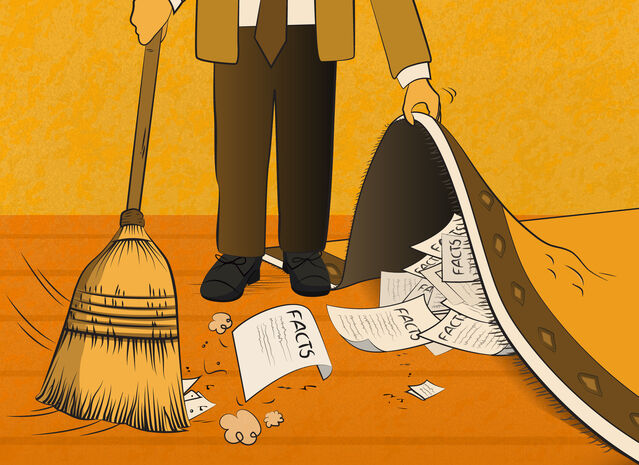Trust
Can You Trust Yourself?
Can we overcome our brain’s tendency to make choices based on our beliefs?
Posted February 21, 2022 Reviewed by Vanessa Lancaster
Key points
- Research has shown that we are biased toward taking in information that agrees with what we already know.
- Confirmation bias can cloud our thinking about what is best for our health.
- Awareness of confirmation bias can help us become seekers of new information for more informed decisions.

Often when it comes to making choices that may affect our health, we hear that we should “listen to our bodies,” “find our flow,” or do things like practice “intuitive eating.”
This sort of thing has been around for a long time. We are reminded of the old adage, “To thine own self be true,” which did not come from a deep thinker like Aristotle, but from the Bard himself, William Shakespeare. This phrase is heard at the beginning of Hamlet, when father Polonius gives his son Laertes advice on how to behave while at university.
Wow. Can you imagine your parents sending you off to college with this advice? What if your version of staying true to yourself made sure you didn’t miss any chances to socialize?
This brings me back to the present and making choices that may affect our health. What if our version of “intuitive eating” or “listening to our bodies” means giving in to a craving for chocolate? Or a strong desire to stay on the couch? What if we really don’t like to exercise or know in our hearts that a piece of chocolate cake will make us feel better?
On the other hand, using our intuition can help. There are times when listening to our bodies is a good thing. When we exercise, stretch, or even do things around the house, we notice when something hurts. Making a move your body isn’t used to or ready for can cause injury. This includes stretching before warming up or stretching too far (it hurts).
Similarly, when eating, we can benefit from paying attention to when we are full and call it quits at that point. We can notice that too much sugar, fat, or salt, makes us feel bad.
Our Brains Can Trick Us
In recent decades, science has enabled us to pinpoint activity in various brain areas that fire up when we are involved in different types of thinking.
Scientists have noticed that our brains like to be efficient. This makes sense. Efficiency helps us sort through the tons of information that come our way during the day. Our brains filter out what doesn’t relate to what we already know or think we know not to become overwhelmed. That way, our brains actually pay preferential attention to what agrees with what we have already learned and what we believe to be true.
Other research has found that we are biased toward the status quo and predictability. Even when a choice will not produce the best results, individuals will go with a default or familiar action. This tendency holds true in many areas of life, including financial decisions, scientific inquiry, and political views.
This type of brain activity is referred to as “confirmation bias.” Confirmation bias can help us breeze through our days but block us from making informed choices.
How can confirmation bias affect our health?
- Confirmation bias can explain why two people with opposing views on a topic can see the same evidence and both come away feeling validated by it. This can happen when the information is presented as something that “may happen” if something else happens. In the realm of nutrition, for instance, perhaps there is information presented that a vegan lifestyle “may” lead to a longer life. A naysayer could conclude that a vegan lifestyle is no guarantee of a longer life, so why bother? Vegans would embrace that statement as confirmation that they are on track for greater longevity.
- We can have false confidence in our judgment. The most blatant example that I can think of is in the area of eating. Research has shown that a dominant belief is that to lose weight, a person has to go on a diet. This is despite repeated and pervasive statistics showing that diets do not work in the long run. And yet, individuals continue to choose to diet, even to an extreme, to lose weight. Often this means trying another diet and another, thinking that there must be one out there that works. This is despite the evidence and their own past experiences.
- Our opinion can become our identity. Your self-image can become one of being a failure at dieting and exercising. Or “just” someone who has irresistible cravings, or maybe someone who was never good in gym class. As time goes on, you can actually accumulate more and more evidence for what you think are immoveable features about yourself.
What does all this mean? In a nutshell, this means that we cannot always be unbiased observers of ourselves. You could say that we cannot trust ourselves. And the kicker is that we often aren’t even aware of it because our brains block observations that could discredit our biases.
What to do?
- We can start by becoming aware that confirmation bias exists and we all have it. It is part of being human.
- We can embrace being wrong. Adam Grant, author of Think Again: The Power of Knowing What You Don’t Know, said that “being wrong is the only way I know I’ve learned anything.” To combat confirmation bias, we can actively search for ways we may be wrong.
- Who we are is a question of what we value, not what we believe. In other words, our beliefs are a compilation of what we have been taught and then what we have observed. In terms of our health, when/if we are deciding to make some positive changes, we can start with why we want to do this for ourselves. It is not helpful to base it on what we think we should be doing or what we have done in the past. Instead, we can explore what we value and want for our lives. Then we can figure out which changes we need to make to reach our goals.
- Commit to learning. We can begin to search out where we might be wrong. We can understand that our beliefs can evolve. We can question our assumptions and expose ourselves to other points of view. If something isn’t working or if we are hooked on a certain perception of ourselves, we can learn something different.
Can we trust ourselves?
Often the answer is no! But we can learn from our mistakes and keep our sense of humor (because we are all flawed humans). We can question our reasoning process, be open to other possibilities, and become willing seekers of information that may be new to us. Then, we can get a better grip on trusting ourselves when it comes to making healthy choices.
References
Segar, M. No Sweat: How the Simple Science of Motivation Can Bring You a Lifetime of Fitness. (2015). American Management Association.
Grant, A. Think Again: The Power of Knowing What You Don’t Know. (2021). Viking.
Westen, D., Blagov, P.S., Harwenski, K., Kilts, C., Hamann, S. (2006). Neural Bases of Motivated Reasoning: An fMRI Study of Emotional Constraints on Partisan Political Judgment in the 2004 U.S. Presidential Election. Journal of Cognitive Neuroscience. 18 (11): 1947-58.
Fleming, S.M., Thomas, C.L., Dolan, R.J. (2010). Overcoming status quo bias in the human brain. PNAS. 107 (13) 6005-9.


